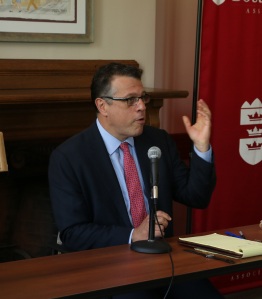
Late Wednesday evening, the House passed a gun violence prevention bill by a vote of 112-38. The bill, H4278, is the latest version of legislation that has been in the works since March 2013 when Speaker DeLeo first convened his Gun Law Task Force to study the issue. The Speaker’s Task Force met more than 15 times between March and December 2013, releasing a list of 44 recommendations for gun laws in February of this year.
At the same time, the BBA’s own Gun Control Working Group conducted a lengthy study on gun reform. Comprised of attorneys with diverse backgrounds including gun owners, civil libertarians, a prosecutor, criminal defense attorneys, a law professor, and health law experts, the Working Group met several times between April and July 2013 to review all of the gun legislation filed by that point, roughly 60 bills, and compose a set of principles designed to be a lens through which any new gun law could be considered.
But the origins of this debate stretch back to the beginnings of this country. In early June, the BBA hosted A Conversation with Michael Waldman, President of the Brennan Center for Justice at the NYU School of Law. Waldman addressed a number of policy issues, including the findings detailed in his new book, The Second Amendment: A Biography.
This project took him on a historical journey through gun laws, propaganda, and politics, tracing the earliest gun rights to militias at the start of the United States. Early Americans cared passionately about militias, which are unlike anything we have today. Every adult male aged 16 to 60 was part of this local unit, and as a result was required to own a gun and keep it in his home. Early Americans saw these groups as a bulwark against tyranny, a political check, and an alternative to a standing, professional army, the ultimate symbol of a king’s power which they had just fought against and defeated. Thus, gun ownership embodied an individual right to fulfill a civic duty as a militia-member.
When the Bill of Rights was debated, its shortest clause, the Second Amendment, received little public discussion, none of it focused on whether the Amendment was an individual right – it was all about militia service. The role of militias was so entrenched, and the world was such a different place, that it was not considered the least bit controversial.
As the country developed, Americans always had guns and there were always gun laws. The Supreme Court largely stayed out of the debate until a 1939 case, United States v. Miller, in which it upheld the first federal gun law, essentially saying that the Second Amendment only protected militias, not individual rights. However, as the country has evolved, this thinking has changed. In 2008, the Supreme Court found an individual right to gun ownership, but noted that this right could be limited, in District of Columbia v. Heller. While all circuits have grappled with this issue, they have overwhelmingly upheld gun laws.
Back to the gun violence prevention law at hand in Massachusetts: in early June, the Speaker introduced a bill, H4121, which quickly became the subject of discussion, praise, and concern for many in the state. As a result, its progress was again shelved while legislators worked on revisions to gain greater consensus, a tall order on any bill, much less one as controversial as gun control. However, this patience appears to have paid off in the bill’s new version, numbered H4278. Representative George Peterson, a Republican and longtime advocate for gun rights, voted in favor of the bill, and the Gun Owners Action League (GOAL), which had opposed the old version (H4121), took a neutral position on the new one (H4278).
Some of the key provisions of H4278 include:
- Bringing the state into compliance with the national background check system
- Authorizing licensed gun dealers to access criminal histories prior to making a sale
- Requiring school districts to have at least one resource officer, two-way communication devices with police and fire personnel in case of emergency, and plans to address the mental health needs of students
- Giving licensing authority broader discretion to deny firearm identification cards or license to carry if there is credible information that the applicant poses a safety risk
- Increasing penalties for failure to report a stolen or lost firearm
- Creating a new State Police unit focused on firearms crime and trafficking
The bill now goes to the Senate with just 22 days remaining on the formal legislative calendar. We will continue to monitor this piece of legislation and keep you updated on its progress.
– Jonathan Schreiber
Legislative and Public Policy Manager
Boston Bar Association




